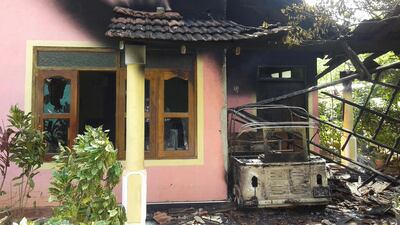The Sri Lankan army enforced a curfew for a second successive night after dozens of Muslim homes and businesses were attacked near the southern city of Galle.
Nineteen people were arrested after the clashes, in which four people were hurt. The violence erupted on Friday after a traffic accident in Gintota spiralled into street clashes between Sinhalese Buddhists and Muslims. Mobs attacked 62 Muslim homes and business premises.
Buddhists comprise 71 per cent of the country's population, while Muslims make up about 9 per cent.
Police and government officials emphasised that the violence had been stirred up by "extremist groups".
"I am aware that some political groups are on a desperate mission to turn this minor brawl into a Sinhala-Muslim clash," Sagala Ratnayaka, Sri Lanka's law minister, said yesterday.
A police spokesperson, who also blamed "a small fraction of extremists in both ethnic groups", said that false rumours and misleading videos had been circulated on social media to fan the violence. Among the 19 arrested were people who were spreading such rumours, including one that Muslims were plotting to attack a Buddhist temple.
The government of president Maithripala Sirisena is keen to crack down on religious conflict after he was accused, earlier this year, of not fulfilling his 2015 election promise of curbing Buddhist nationalism.
In April and May, the Secretariat for Muslims, a non-profit group based in Colombo, recorded at least 20 attacks and threats against Muslims, mosques and their businesses. They came from Buddhist right-wing groups such as the Bodu Bala Sena, the Sinhala Rawaya and the Sinhala Jathika Balaya, which have emerged over the past five years.
These groups, particularly the Bodu Bala Sena, gained in strength during the previous presidency of Mahinda Rajapaksa. Between 2012 and 2015, before Mr Sirisena came to power, Buddhist nationalists were at the forefront of attacks on Muslim-owned shops, mosques and Muslim shrines.
Most prominently, in June 2014, four people were killed and nearly 100 injured when Buddhist mobs attacked Muslims in the towns of Aluthgama and Beruwala.
Mr Rajapaksa and his brother Gotabhaya, who was defence secretary at the time, were accused of tolerating, and perhaps encouraging, these Buddhist groups when they were in power. Gotabhaya Rajapaksa attended Bodu Bala Sena events several times and the Rajapaksa government's hyperactive celebrations of Sri Lanka's Buddhist heritage chimed with the nationalists' own version of their country's character.
Mr Sirisena, having defeated Mr Rajapaksa in the 2015 presidential election, said that he would pay greater attention to human-rights issues. He even promised to co-operate with the United Nations Human Rights Council's investigation into war crimes committed by the army during the Sri Lankan civil war, which ran from 1983 to 2009.
"Religious disturbances are developing in the country due to the activities of extremist religious sects," Mr Sirisena said in his manifesto. "In this situation, the extremist groups mutually nourish one another and are expanding their activities."
But optimism that Mr Sirisena would crack down on these groups has grown into disappointment. In a report published in May, the International Crisis Group noted weakening support for the president from minorities such as Tamils and Muslims.
The government "continues to drag its feet on impunity for human rights violations and abuses of power", the report said. "Torture of detainees remains routine, and the draconian Prevention of Terrorism Act has yet to be replaced, as promised."
In May, Galagoda Aththe Gnanasara, the secretary general of the Bodu Bala Sena, made a series of speeches instigating violence against Muslims. He urged his followers "to go and occupy any lands" owned by Muslims, claiming that the country belongs morally to its Buddhists.
Under pressure, the government arrested him on charges of hate speech but he was later released on bail; his trial has yet to begin.
Buddhist nationalist groups sense the government's weakness or unwillingness to act against them, said Aasiff Hussein, a political analyst and writer based in Colombo.
"Muslims are starting to feel newly vulnerable, as they felt four or five years ago during the Rajapaksa era," Mr Hussein said. "The only thing that will truly send a signal is for the top leaders of these nationalist groups to be arrested and put on trial."

Sri Lanka curfew after Buddhist-Muslim violence in Galle
The government is keen to crack down on religious conflict after president Maithripala Sirisenawas wa accused of not fulfilling his 2015 election promise of curbing Buddhist nationalism
Most popular today
